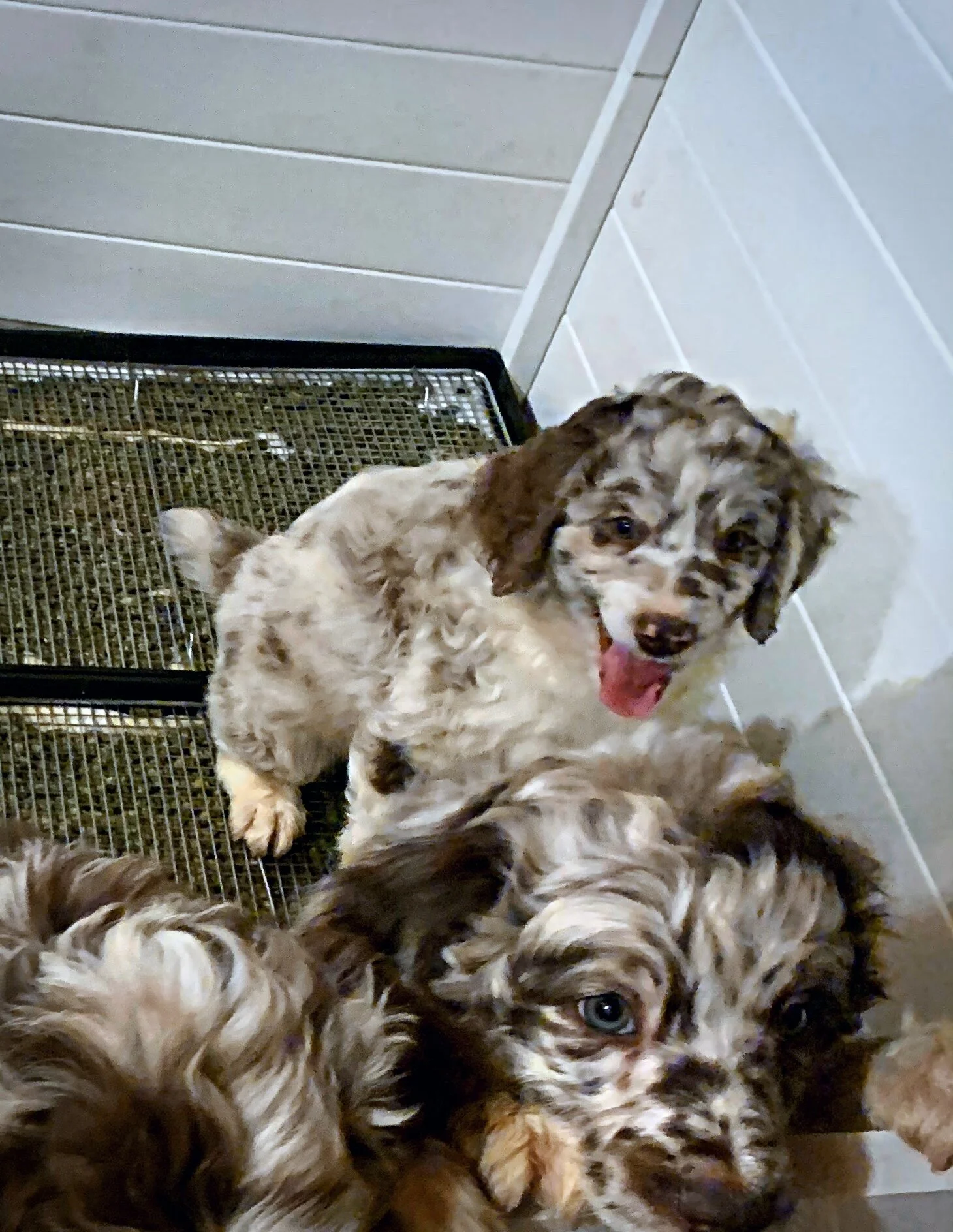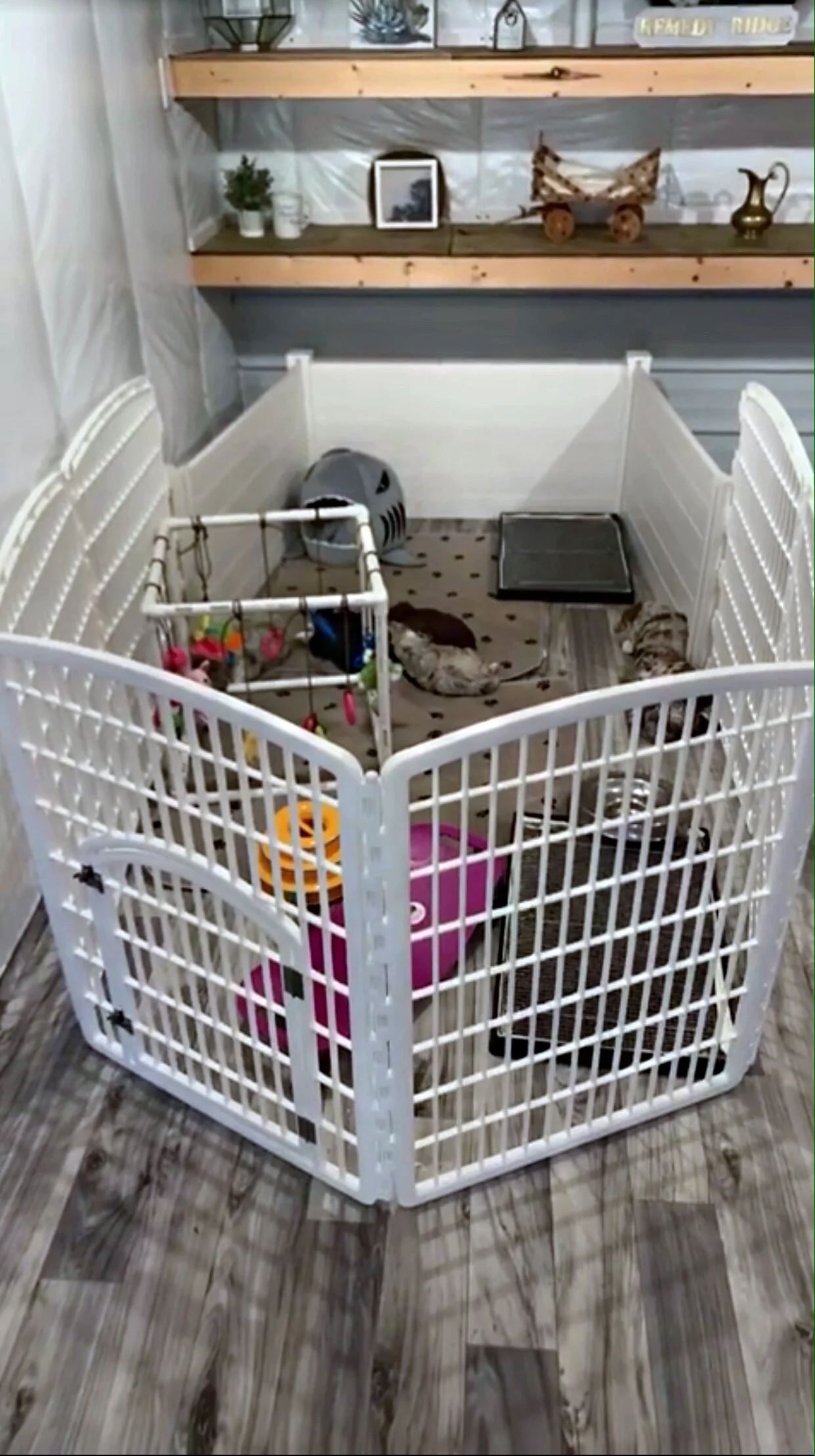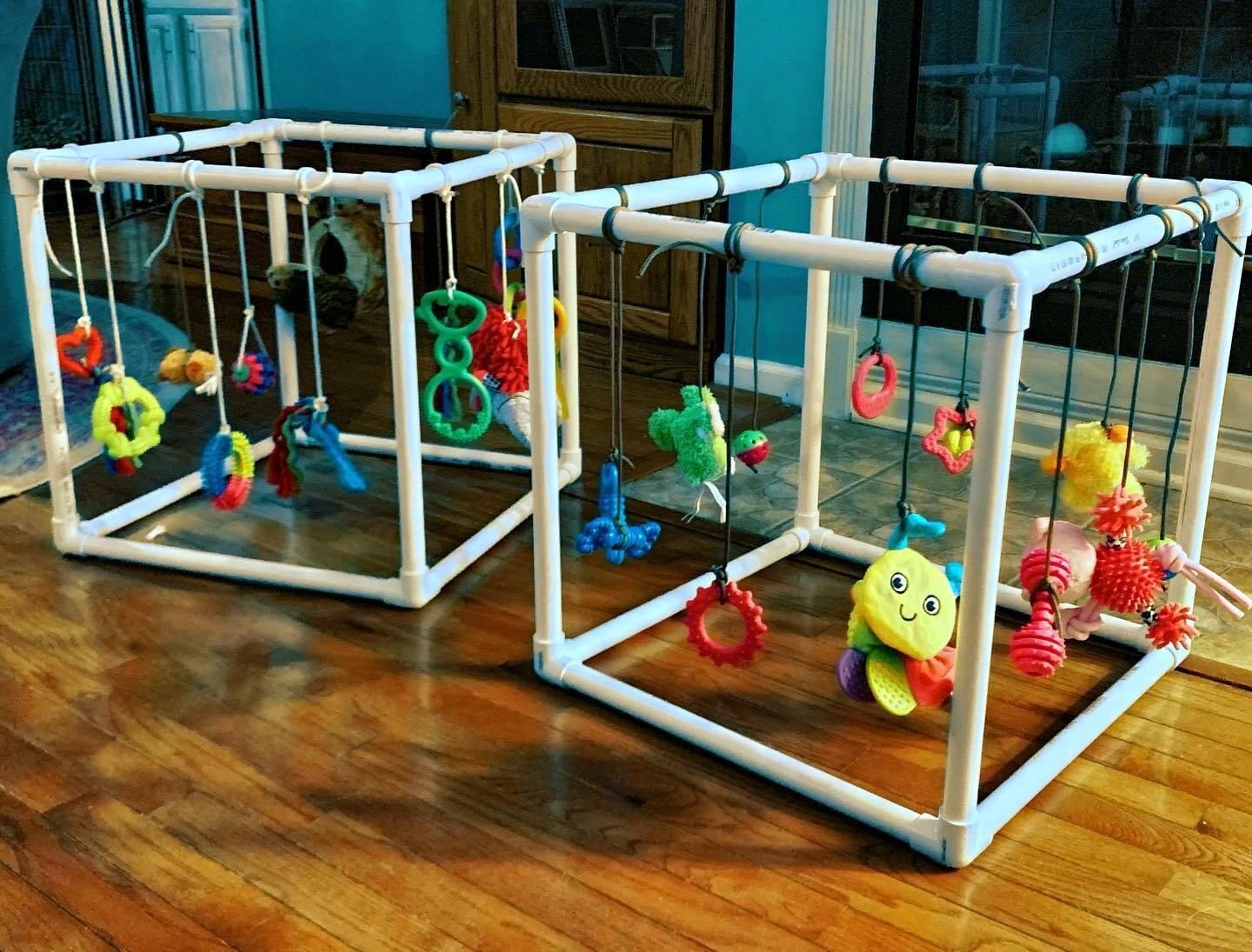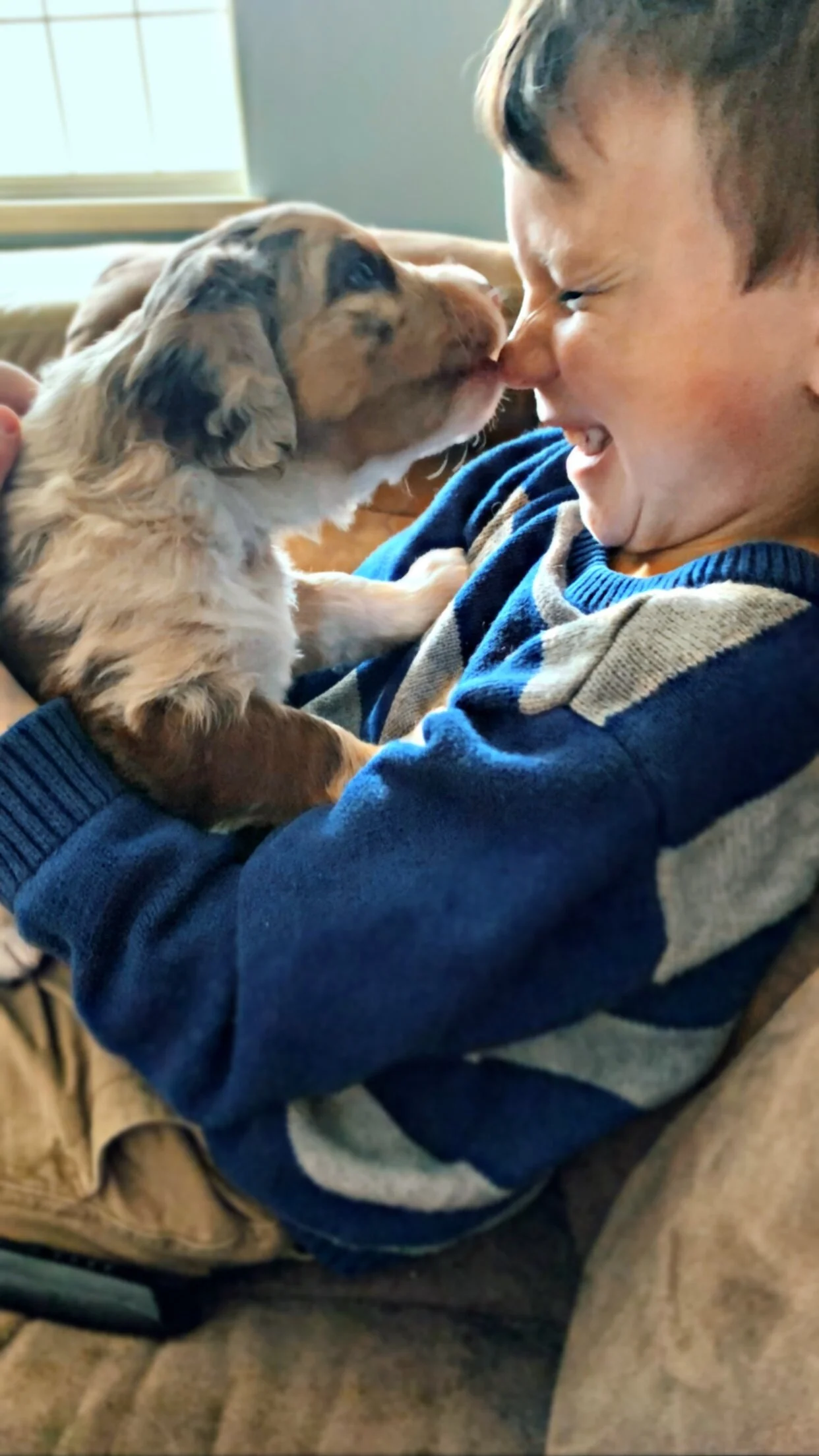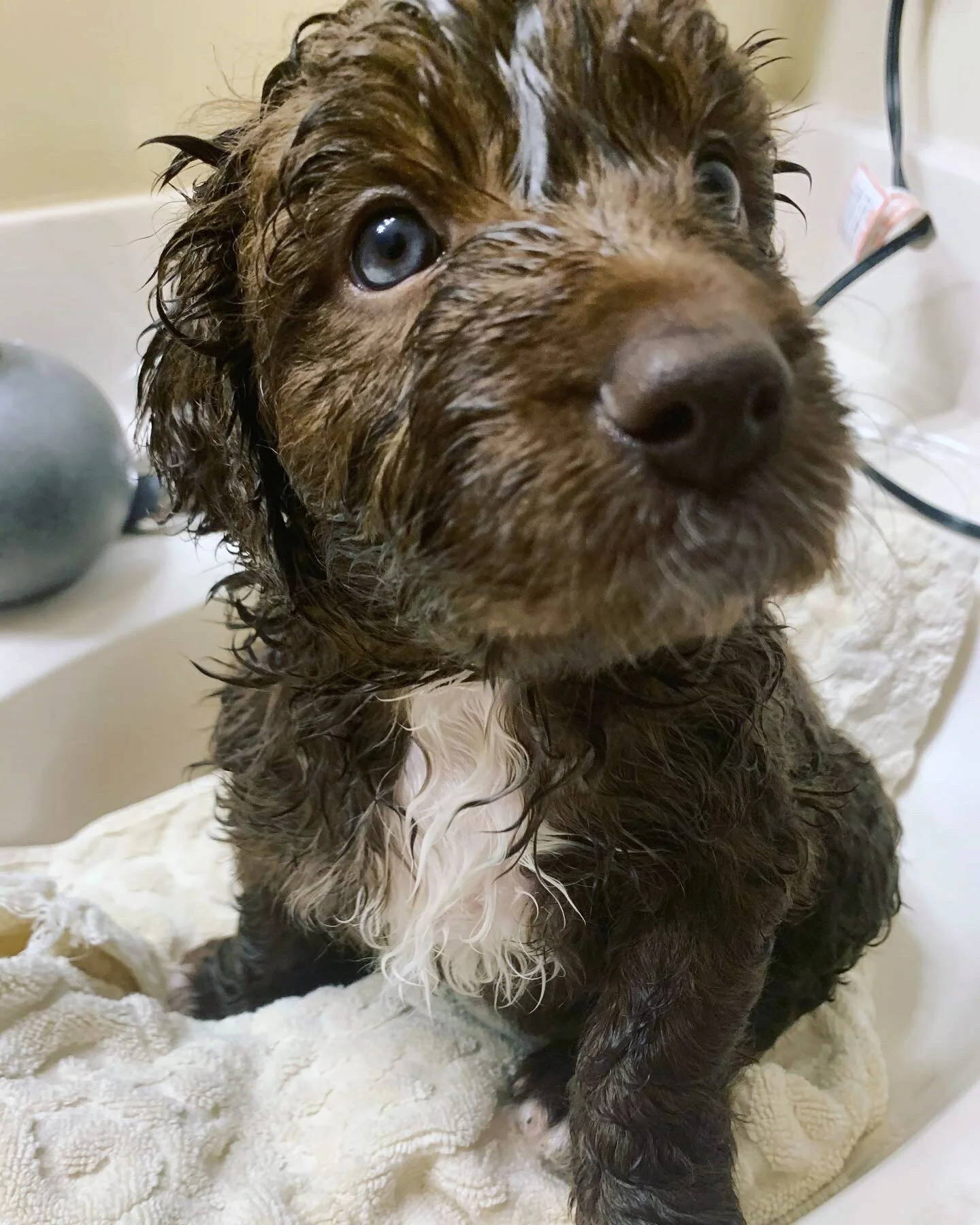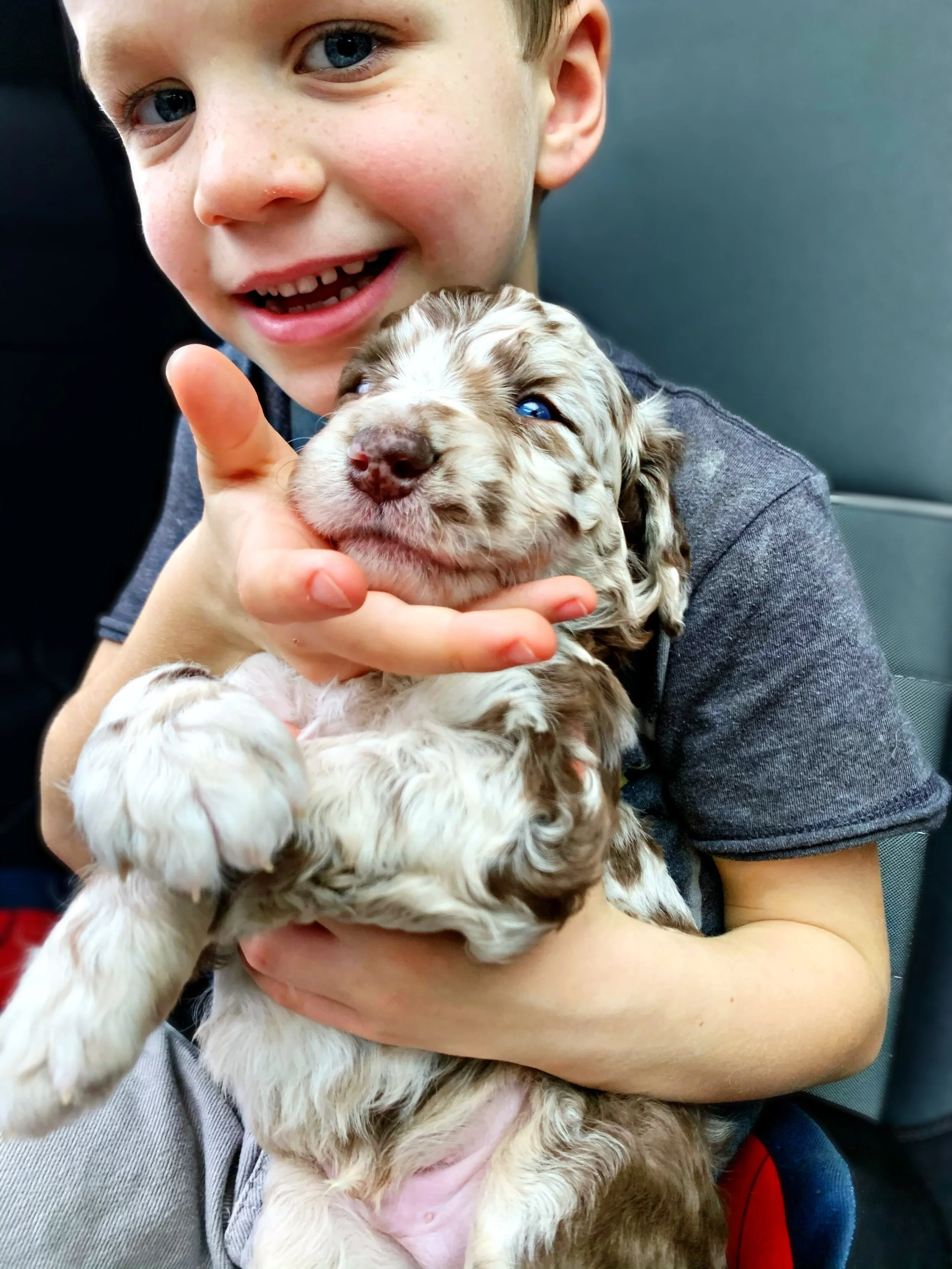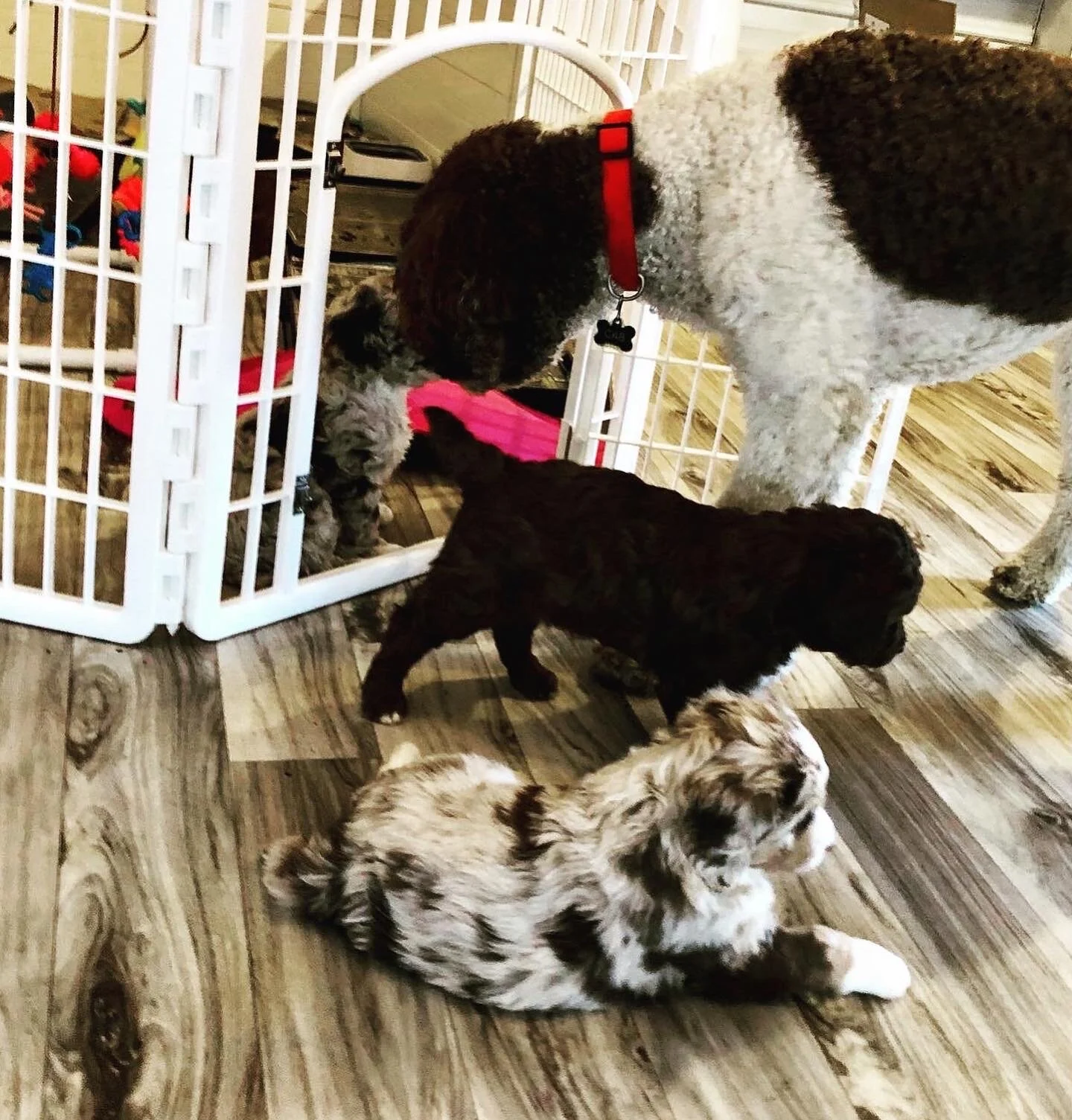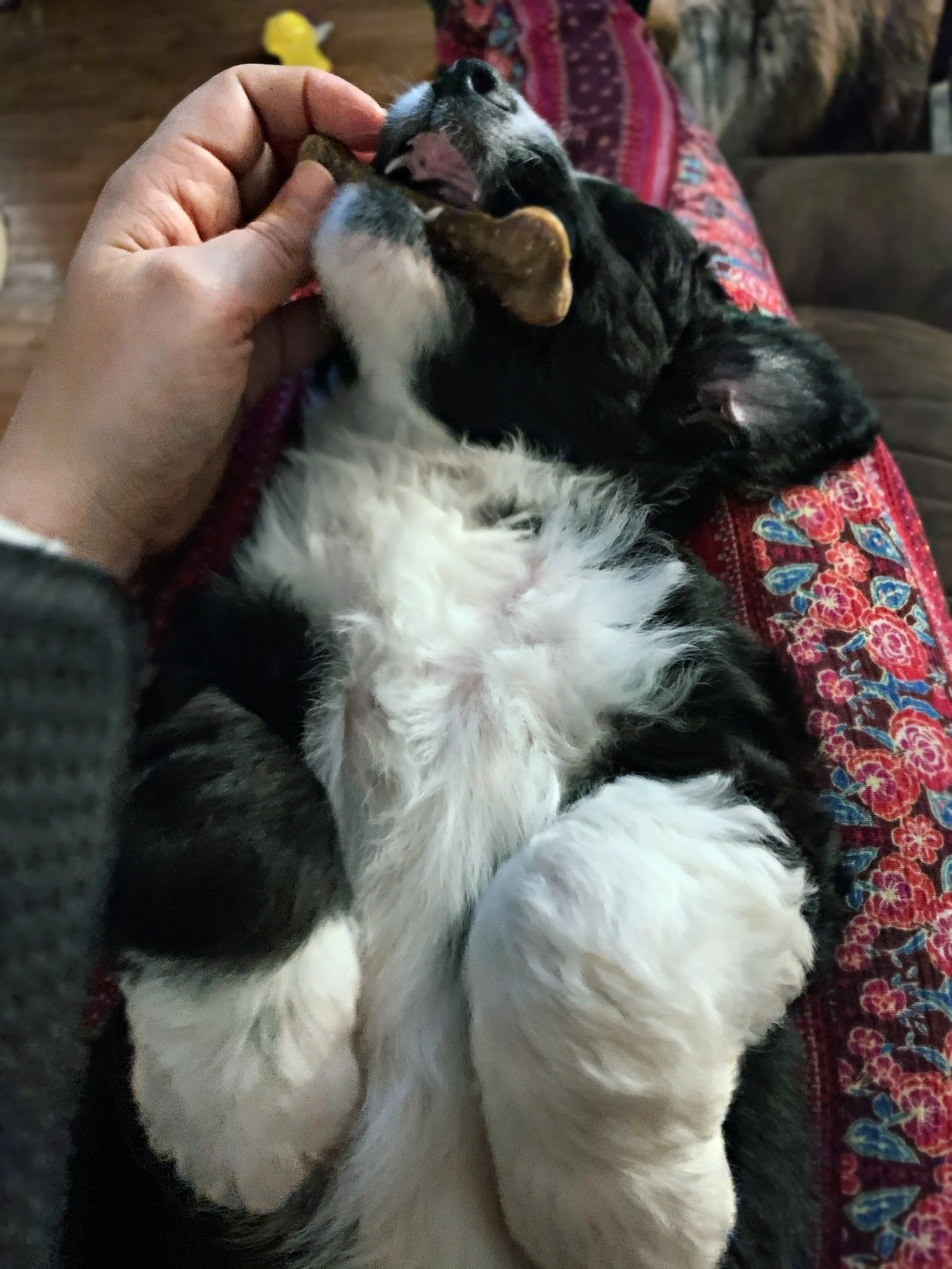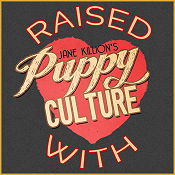We raise our puppies with the best whelping supplies on the market. Everything down to the food, cleaning supplies and padding that we use provide puppies with the appropriate environment they need to remain in optimal physical and mental health. Our puppies are raised on evidence based practices and research that has been made available to the general public for many years now. We stay up-to-date with emerging evidence based practices to give our puppies the best start. Many our of buyers are coming to us because they would like to therapy or service train their puppy and we understand that the first 8 weeks of life plays a pertinent role in the possibility of the puppies success as an adult dog. Not many people are aware of the research that exists that has provided many case studies and evidence that puppies properly socialized and desensitized during the first 8 weeks has a lasting positive impact on them as they age. Our practices correlate with improved heart performance, healthy adrenal gland functioning, higher ability to respond and tolerate outside stressors and even a higher resistance to diseases. We strive to produce well adjusted puppies so they can obtain your goals for them and meet your unique needs. Our mission is to make the world a better place with our puppies who are actively Healing Souls with Paws of Gold.
Good Whelping Dens:
We provide our dogs with top-notch pet dens that are appropriate for their sizes. It is important to the mother psychologically to have the perfect sized whelping pen that makes her feel safe and secure. Part of feeling secure means that the pen offers privacy and is not too big. It is instinctual for dogs to want privacy since they are in a very vulnerable position while raising puppies. For the first 3 weeks the whelping pen is set up in our walk in master closet where the mom is able to lay just 10 feet away from me when I am in bed. This way she is most comfortable during this period and I can closely monitor her and the puppies.
At 4 weeks we move Mom and puppies into our supreme lofted barn facility outside our home to provide puppies who are beginning to walk with an extended play area. Our facility has electricity, insulation and an ac/heating unit to keep the temperature at optimum comfort for Mom and her puppies. IT even has a loft we often sleep in. Its my favorite place to be!
Whelping Pads:
We have carefully selected the type of whelping pads that we use. We have selected durawhelp pads due to the many benefits they offer. Most importantly, they offer traction and researchers have found a correlation between puppies not having appropriate traction during the first 8 weeks of life and hip-dysplasia. Traction prevents puppies from slipping constantly and allows them to get their feet underneath them when feeding and learning to stand. Great genetics can only take a dog so far, the rest of the work lies in the environment we as responsible owners provide. The traction is also a safety mechanism in that the mom is less likely to bury a puppy underneath her. They have velcro on them as well which prevents puppies from getting buried underneath bedding that can otherwise lead to suffocation. The durawhelp pads also have maximum absorbency which means the little ones are not ever left sitting in their accidents.
Puppy Rail:
Puppy rails are a safety mechanisms used by experienced breeders to ensure that the dam does not accidentally squish one her puppies against the whelping pen walls. The rails leave enough room for a small puppy to fit underneath but not enough for the dam.
Weighing Puppies:
It is crucial to keep track of puppy weights to make sure they are meeting size and growth standards. This ensures we notice if a puppy is failing to thrive and that puppies are getting enough milk. If not we will step in and make sure the puppy gets extra feeding time with mom and if that does not work we will begin to supplement. Puppies are weighed daily the first week and then once a week after that.
Litter Box Training:
All of our puppies will be introduced to a litter box. We use litter boxes to teach the puppies that it is best to go in one place to potty and that place is not near your sleeping area, play area or eating area. We fill each litter box with organic food grade alfalfa pellets in case they are ingested. We learned how to litter train puppies by investing in the“Puppy Culture” training series. By following their steps, puppies can be completely litter trained in just two days! This teaches puppies that going potty is for designated areas making outdoor potty training so much easier on you.
Food:
lifesabundance.com/Remedyridgeaussiedoodles
All of our puppies and adult dogs are on Life’s Abundance (Grain-free). What I love about Life’s Abundance is that not only have they never been recalled or linked to degenerative cardiac myopathy (or any other health concerns related to dog foods on the market) they have a strong product line which makes them a one stop shop for most of your dogs nutritional and wellness needs. I also found them to be a bit cheaper per pound then other competitive brands that meet the same standards mentioned above. Each bag will be cooked fresh and dry food over 6 weeks often grows mold and toxins.
More about Life’s Abundance Al Life Stage Grain Free Dog Food:
For optimal health of our dogs and puppies we feed everyone LA’s premium all stage grain free dog food which contains only the finest ingredients, like …
• A proprietary blend of vitamins & minerals
• High-quality protein from turkey, chicken & whitefish meals for strong muscles
• An antioxidant system including vitamins C & E
• Prebiotic fiber & guaranteed probiotics
• Guaranteed omega-3 fatty acids for healthy skin & a shiny coat
• Guaranteed calcium & phosphorus for healthy teeth & strong bones
• Dietary fiber to help maintain a healthy digestive tract
We start puppies on this food at 3.5 weeks old pureed with Organic Goats Milk. We slowly transition puppies off the Goats milk and by 7 weeks this is 100% their food source in addition to extra probiotics and a healthy bone and join supplement we add to their food (which we recommend you continue) By 8 weeks old they will be ready to continue their solid food diet with you. We will send you home with a two-day sample of this food and highly recommend it.
Activity Center:
The Activity Center is opened up to the puppies at 4 weeks old. The activity center extends from the whelping pen and contains a variety of toys with different textures. We also hang toys from PVC piping to give puppies more of a dynamic experience. We rotate toys out so they never get bored (which we encourage you to do at home). This stimulation helps desensitize puppies and keeps their growing brains healthy and happy. They learn healthy play in the activity center which prompts socialization.
Socialization:
With a background in psychology & a masters in social work, I fully understand the importance of socialization for not just humans, but dogs too. Just like humans, animals also need to be appropriately socialized in order to thrive in the future. We expose our puppies to as many other people and animals as possible with the understanding that if these puppies are not well adjusted to their current surroundings they will not adjust well to yours. WE create healthy and safe experiences for the puppies understanding that just ONE highly adverse experience can lead to the puppy being fearful for life. That is why it is SO important that you protect your dog from these experiences for the first few years of life if your goal is to be able to have a confident/non aggressive dog. With that being said, sheltering your dog from other people and other animals can also have adverse effects. Exposing your dog to safe people and pets you KNOW are friendly is the best thing you can do. Proper socialization, coupled with various desensitization techniques sets these puppies up for success, their genetics (nature) can only take them so far, you have to give them the nurture they need to grow into healthy minded adults. We begin all of that here for you!
Desensitization:
We do a lot of different things to desensitize the puppies to stimuli they will see once leaving our home. Desensitization techniques help build puppy confidence that manifests into adulthood. We follow a list of evidence based practices based on research to promote early neurological stimulation. The below exercises stimulate a puppies neurological system which correlate later in life with improved heart performance, healthy adrenal gland functioning, higher ability to respond and tolerate outside stressors and even a higher resistance to diseases.
This list includes various tactile and thermal exercises (but not limited to):
Holding Puppy in Different Positions: We hold puppies in the cradle position in our arms starting right after birth and progress to holding them in different positions a few days later which include under there arms facing us and facing away from us. As suggested by neuro research, we also hold puppies in the positions mentioned in this article by Dr. Carmen Battaglia.
Ears: We play with their ears often and intentionally dab the insides of their ears with cotton balls. This will help with grooming appointments and the very important task of ear cleaning to prevent ear infections.
Nails and Paws: All our puppies get their nails trimmed weekly. This helps them prepare for future grooming appointments and also gets them used to the feeling of people handling their paws. Paw handling is part of the Canine Good Citizen and Therapy Dog International evaluation.
Bathing: We bath the puppies twice a week for sanitary purposes and to get them used to water.
Blow Drying: Every time we bath the puppies, we also blow dry them so that they get used to the feeling of the blow dryer when they get groomed. Blow dryers are also very noisy and produce windy heat which helps desensitize puppies quite a bit.
Grooming: We use motorized hairbrush turned when brushing the puppy to get them used to the feeling of the vibration of the trimmers. Getting them desensitized to the trimmer at a young age will help reduce anxiety in the future. We recommend that you continue this until your puppy will need his/her first full trim around 6-9 months old. We also use the actual trimmer to do sanitary trims a couple times before they go to their new homes. See more on Aussiedoodle grooming here.
Car Rides: We take the puppies on a few car rides before they go to their new homes. This helps get them used to the feeling of the car to help avoid car sickness.
Different People: Our puppies are exposed to a variety of people of all ages. We have a 3 and 5 year old in the home and a wonderful extended family and group of friends. This makes them adjust better to different types of people.
Adult Dogs: Our puppies also get time with the other adult dogs in addition to their mom. We do regular one on one time through the day with each puppy, and during that time they get to play with the other dogs in our home. We own a 10 year old Australian Shepherd and she is another wonderful example for the puppies to learn from.
Couch Time: We bring the puppies in from the puppy barn individually for couch time. As much as it is important for puppies to learn in a social dynamic with each other, they also benefit from intimate human contact and gaining confidence away from litter mates.
Vacuums, Brooms and Mops: We regularly use the vacuum, broom and mop around the puppies to get them used to the sounds and movements.
Loud noises: It is easy to do loud noises in our house with two young boys, but we also will play different sound tracks with different noises on them to have the puppies learn to deal with loudness or unexpected noises.
Music/Television: We often will have different media on in the puppy barn, even when we are not in it. This helps get them accustomed to a larger variety of common household noises. We also make sure that the puppies get lots of silent time too, helping them adjust to different households they will go into.


